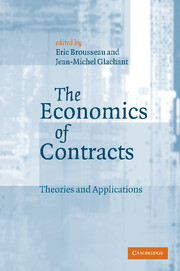Book contents
- Frontmatter
- Contents
- List of figures
- List of tables
- List of contributors
- Acknowledgments
- Part I Introduction
- Part II Contracts, organizations, and institutions
- Part III Law and economics
- Part IV Theoretical developments: where do we stand?
- 10 Transaction costs and incentive theory
- 11 Norms and the theory of the firm
- 12 Allocating decision rights under liquidity constraints
- 13 Complexity and contract
- 14 Authority, as flexibility, is at the core of labor contracts
- 15 Positive agency theory: place and contributions
- Part V Testing contract theories
- Part VI Applied issues: contributions to industrial organization
- Part VII Policy issues: anti-trust and regulation of public utilities
- Bibliography
- Index of names
- Subject index
11 - Norms and the theory of the firm
Published online by Cambridge University Press: 16 January 2010
- Frontmatter
- Contents
- List of figures
- List of tables
- List of contributors
- Acknowledgments
- Part I Introduction
- Part II Contracts, organizations, and institutions
- Part III Law and economics
- Part IV Theoretical developments: where do we stand?
- 10 Transaction costs and incentive theory
- 11 Norms and the theory of the firm
- 12 Allocating decision rights under liquidity constraints
- 13 Complexity and contract
- 14 Authority, as flexibility, is at the core of labor contracts
- 15 Positive agency theory: place and contributions
- Part V Testing contract theories
- Part VI Applied issues: contributions to industrial organization
- Part VII Policy issues: anti-trust and regulation of public utilities
- Bibliography
- Index of names
- Subject index
Summary
Introduction
Most standard models of incentives and/or organizations assume that economic agents are self-interested and must rely on formal contracts enforced by the courts to uphold their relationships. In reality, of course, many economic transactions are sustained by self-enforcing (“implicit”) contracts, or norms of behavior, such as honesty or trust. An interesting question to ask is: does ignoring norms/self-enforcing contracts lead to misleading conclusions? That is, would a theory of incentives or organizations that incorporated norms look very different from the standard theory?
In this chapter, I will consider this question, focusing particularly on some of the attempts economists have made in the last ten years or so to integrate norms into the theory of the firm. I will argue that (a) although norms are undoubtedly very important both inside and between firms, incorporating them into the theory has been very difficult and is likely to continue to be so in the near future; (b) so far norms have not added a great deal to our understanding of such issues as the determinants of firm boundaries (the “make-or-buy” decision) – that is, at this point a norm-free theory of the firm and a norm-rich theory of the firm don't seem to have very different predictions.
Background
To begin with, it is worth mapping out some of the territory. I will follow Richard Posner in defining a norm as “a rule that is neither promulgated by an official source, such as a court or a legislature, nor enforced by the threat of legal sanctions, yet is regularly complied with” (see Posner 1997).
- Type
- Chapter
- Information
- The Economics of ContractsTheories and Applications, pp. 180 - 192Publisher: Cambridge University PressPrint publication year: 2002
- 7
- Cited by



